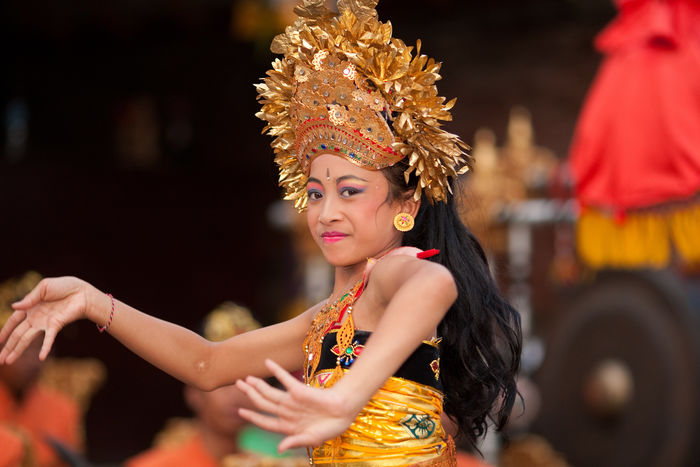What are the basic cultural do's and don'ts?
There are several main differences in behaviour that westerners should be aware of before visiting Indonesia. In the most popular tourist destinations, locals will take less offence to cultural infringements than they may elsewhere, but it is still advantageous to try and avoid certain faux pas':
•Avoid contact between opposite sexes. Indonesia is a more conservative country in many ways than Western countries are. Open displays of affection will no doubt offend those within the area and result in disapproving looks. Despite contact between opposite sexes being frowned upon, contact between the same sex is a regular sight. It is used as a gesture of friendship.
•Expect little personal space. Indonesians appear to have little concept of an idea of personal space. In fact, it tends to be the case that being close to someone when you talk to them indicates friendliness. This attitude is reflected in the number of locals that will strike up conversations with you in any conceivable situation. Most people do not find this a problem after a time but it can take a while to adjust to initially.
•Stay calm and cheery. Westerners appear to Indonesian s as a hurried and stressed people. The local population tend to be extremely relaxed; Confrontation is avoided at almost all costs, so shouting and getting angry will not produce results if things don't go your way. With the transport system and climate as they are, staying calm and unhurried is the only way to enjoy the country.
•Limit the use of your left hand. The left hand is considered dirty in Indonesia. Try to avoid passing money, food, shaking hands or touching people with your left hand as it will be considered offensive.
•Dress conservatively. Despite the warm climate, most locals wear long clothing as opposed to shorts and t-shirts. Women will receive more unwanted attention if they do not dress conservatively especially away from the tourist destinations. If visiting a mosque or temple, it is essential to cover up as much as possible; entry may be denied if you turn up without your shoulders and legs covered. Before entering also remove your footwear and leave it outside. This goes for when visiting somebody's house as well.
What are the people like there?
Undoubtedly amongst the friendliest in South East Asia and possibly even the world. It is highly unlikely that you will go an entire day in the country without at least one stranger striking up a conversation with you. However, there are an element in the tourist industry who will hassle you, overcharge you and lie to you if they think it will make a sale. This is certainly not the case of all people making a living off tourists, but this element does exist. Try to meet locals outside the tourist industry as it will doubtless prove a very rewarding experience.
What sort of clothing is acceptable? Do women have to wear a head scarf?
Generally, the more conservatively you dress the better. In very touristy places such as Kuta in Bali, you can essentially where what you like. In places where tourists are uncommon reserved dress is encouraged. If in doubt try to emulate the locals in the area you are. Although Indonesia is an Islamic country, women are not required to wear a jilbab (head scarf). This does mean that women dressing immodestly will provoke a greater reaction than men doing so.
Is it difficult to talk to the Indonesians?
It's perfectly possible to take a long trip around Indonesia without being able to speak a word of Indonesian, but it's certainly helpful to be able to. Places that get a lot of tourists, and Bali in particular, have English speakers everywhere but this is not the case in other parts of Indonesia . The more off the beaten track you go, the more speaking some Indonesian becomes necessary. The Indonesian people are generally very appreciative of any attempts to speak their language, not least because so few foreigners are able to.
Am I allowed to sunbathe topless or nude?
This is frowned upon in Indonesian culture, and you will almost never see a local Indonesian doing it. Nevertheless, going topless on some beaches such as Kuta on Bali is commonplace. The locals here are used to foreigners and don't care so much. In less touristy places, particularly where there are Indonesian families on holiday, it is considered rude and offensive. Going nude at beaches is illegal in Indonesia, and is impossible pretty much everywhere. If you really want to do this, your best bet is to find somewhere remote where you are not sure not to be seen.
If I am invited to an Indonesians house, what sort of presents should I bring?
Basically, anything representative of your country that is difficult to get in Indonesia is a good idea, even things such as photos and postcards of where you come from. Fancy chocolates are also a good idea, as these are next to impossible to get in Indonesia.
What are useful local words to know?
Below is a selection of Indonesian words, and their translation, that you may find useful in your travels:
General terms
Angkot Small minibuses that have set routes. They usually cover fairly local distances only
Bahasa Bahasa Indonesian is the country's national language. However, many different forms dialects are spoken across the archipelago.
Batik Decorative cloth made using wax and dye. Areas with wax on do not get coloured leaving attractive designs.
Becak A bicycle-rickshaw - another form of local transport. Pronounced betjak.
Bemo Used to describe small minibuses, similar to angkots. Originally used to describe motorised becaks.
Bisnis Business. Usually encountered on train and bus tickets.
Ekonomi Economy class
Eksekutif Executive class. This is a step up from business and is pretty luxurious.
Gamelan Traditional balinese music orchestra comprised mainly of percussion instruments such as xylophones, cymbals and gongs.
Gang Alleyway or a small road of a larger road
Gili Islet
Gunung Mountain e.g. Gunung Bromo
Homestay Budget accommodation. Normally small, family run affairs. Jalan Street or road. It is often shortened to JL or Jln.
Kamar kecil Toilet or 'small room'.
Kraton Walled city palace. Yogakarta exhibits an excellent example.
Kretek Indonesian sweet-smelling cigarettes which are made from cloves.
Losmen Cheap, basic accommodation. Very similar to homestays.
Mandi Indonesian 'scoop and slosh' method of washing. Comprised of a tank of water and a bucket to ladel the water over yourself.
Masjid/mesjid Mosque. The first call to prayer is at 4am. Try not to get accommodation too near to one of these!
Sasak Native people of Lombok. Sasak also describes the dialect of Indonesian they speak.
Taksi Taxi. Make sure you ask for fares to be on the argo (meter).
Taman Term for a nature reserve or ornamental park.
Warpostel Handles both postal and private telephone services
Wartel Private telephone office
Warung Basic food stall. It is very cheap to eat at these.
Food and drink
Food and Drink
Air Water.
Air jeruk Citrus fruit juice
Arak Rice based alcoholic drink that is usually home-brewed. It is very strong, but can taste better when mixed with lemonade.
Ayam Chicken
Bakar Barbequed, roasted or grilled. Used together with names of other foods e.g. Ayam bakar is roasted chicked
Bakso Meatball soup
Brem A slightly weaker version of arak. Similarly unpleasant.
Cumi cumi Squid
Daging sapi Beef
Durian Spikey green fruit. Quite tasty, but many are put off by its pungent smell.
Es krim Indonesian ice cream, made of flavoured ice and lumps of fruit. Western style ice cream is usually called 'ice cream' as opposed to es krim.
Gado gado Popular Indonesia dish of vegetables, bean sprouts, spicy peanut sauce and sometimes egg. Served cold.
Ikan Fish
Ikan belut Eels - a Balinese delicacy
Kentang Potatoes. Used in Indonesian dishes of a dutch origin.
Kodok Frog - a rare delicacy
Kopi Indonesia coffee. Served black and very sweet
Kopi susu White coffee, made with condensed milk
Krupuk Shrimp crackers
Lombok Chilli
Mie goreng Noodles fried with vegetables and/or meat, topped with a fried egg. Greasy.
Nasi Rice
Nasi goreng Rice fried with vegetables and/or meat topped with an egg. Often served with krupuk.
Nasi putih White rice, usually steamed
Roti Bread, nearly always sweet
Sambal Spicy chilli sauce available almost everywhere. Sambal asli is a similar sauce with a garlic flavour.
Sate Popular tasty Indonesian dish. Made of skewered pieces of meat, grilled and served with a spicy peanut sauce.
Soto Meat and vegetable soup. Served with rice.
Tahu Tofu. Often sold as a snack at warung or on transport by hawkers
Teh Indonesian tea
Telur Egg








Comments